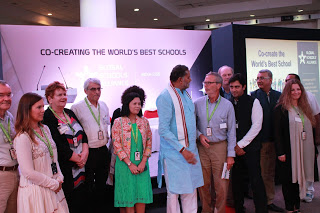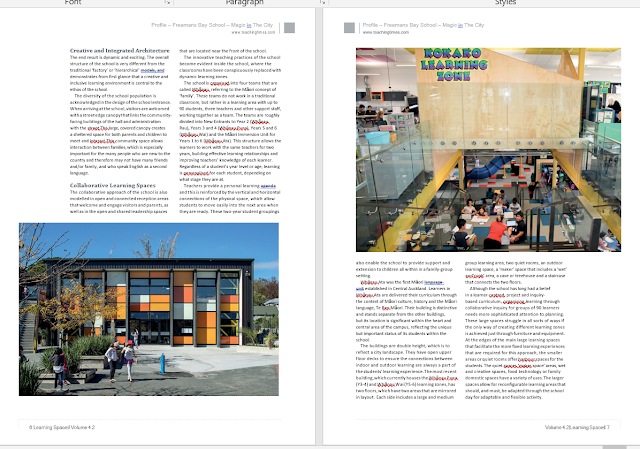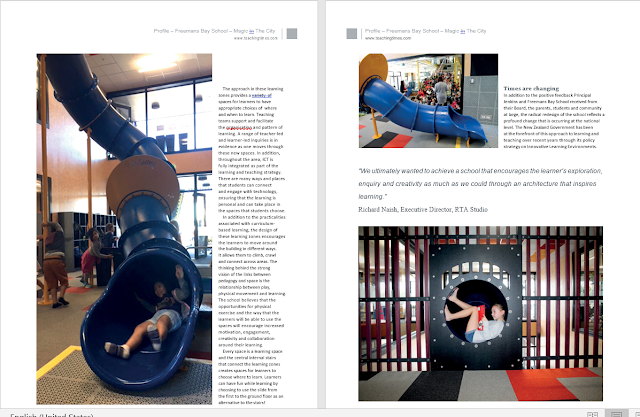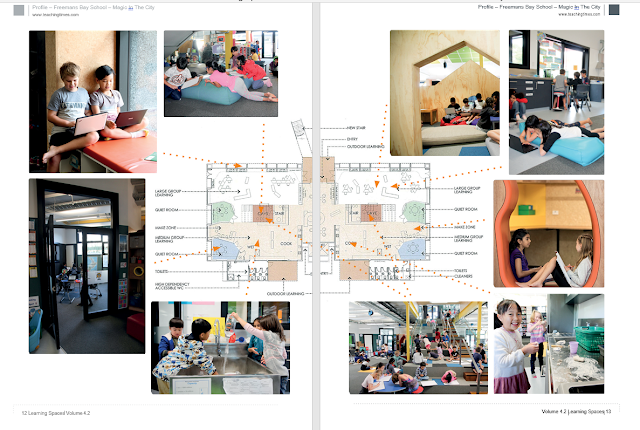
Hi My name is Sandra Jenkins. Across the globe there is a movement to re imagine education to provide settings that are learner led and relevant to the future lives of learners. This blog captures some of my journey as part of that movement
Showing posts with label e-learning. Show all posts
Showing posts with label e-learning. Show all posts
Tuesday, February 5, 2019
Learner Led Design
Freemans Bay School is recognised as a Microsoft Showcase School and is a Global Schools Alliance founding member. Late last year we made a video to support our application to continue being a Microsoft Showcase School. This short video clip shows the development of our school build and how the learner led design is reflected in both pedagogy and learning spaces. Our learner led design has a lens on digital technology, ELearning and developing a future focused curriculum.
We also had an article published in Learning Spaces magazine. This magazine is published by Association of Learning Spaces and pulls together the views of designers, educators, architects and those interested in promoting modern curriculum through spaces and pedagogy. The magazine is well worth subscribing to. The article, also shows our thinking around the learner led design at Freemans Bay School,


Saturday, October 24, 2015
Teacherpreneurs, Twitter and Transformation
Teacherpreneurs are considered to be highly effective, connected and resourceful educators who actively seek opportunities to grow their skills, collaborate, share best practice, ideas and research. They have a passion and determination to improve education in their setting and beyond. What excites me is that teacherpreneurs can develop leadership opportunities to influence positive change to education systems for the better. With the incredible rise in technology and more demand for student agency the teacherpreneur can enable change to determine a more relevant curriculum for learners. These leaders create opportunities for educators to connect, share, grow their knowledge and expertise and influence education systems to be relevant to our students future roles in their communities. Teacherpreneurs cross oceans and cultures to make connection with other educators and advocate to transform curriculum. Their focus is to co create new learning that is relevant, authentic, personalised and technology rich, building on the diversity and strengths of all learners
Although each school at the symposium was from a uniquely different part of the world we all shared a vision of working together to promote rich, innovative and personalised education. You can see from the following table of participants the diversity represented. It was humbling as well as inspirational to be part of this GSA symposium.


October is Connected Educators month globally and in Aotearoa, New Zealand.
Connected Educator Month supports educators to thrive in a connected world. Sharing and collaboration centred on personalising learning needs and strengths across our country and global networks.
Connected Educator Month supports educators to thrive in a connected world. Sharing and collaboration centred on personalising learning needs and strengths across our country and global networks.
Thinking about Connected Educators month has prompted me to update my reflective blog and share my own personal experience about the power of connecting on Twitter and how Twitter has facilitated amazing learning and incredible experiences for me. Through Twitter I have connected with teacherpreneurs and innovative educational leaders from all over the world.
In 2013 I was a new Twitter user. I only had a vague idea what it was about – but I set up an account for Freemans Bay School. I received a tweet from Lene Jensby Lange asking about our e-learning model at Freemans Bay School. Lene had checked out my principal’s blog and followed up with a couple of questions about our e-learning model
Lene is a founder of Autens Educational Design Consultancy in Denmark. This consultancy facilitates and leads innovation to support educational leaders to align their school vision with new and renovated school design. I asked Lene if I could meet her in Denmark to discuss links between learning design and school design as part of my travel fellowship in 2014. Not only did Lene agree, but she showed me around a whole lot of schools and organisations and I was able to stay with her and family in Copenhagen – where the conversations flowed into the night.
Since then we have been great twitter mates! We often have tweet or Skype, problem solving and sharing perspectives and experiences. Networking with Lene led to being invited to become a member of the Global Schools Alliance.
GLOBAL SCHOOLS ALLIANCE (GSA)
The vision of GSA was developed by a group of global educators:
- David Price, OBE (member of the Most Excellent Order of the British Empire)
- Andrew Raymer (Founder and former Head of Matthew Moss UK)
- Dr. Steven Edwards (White House and World Bank advisor)
GSA aims to have innovative schools collaborate and be part of a learning community that will influence education systems across the world.
Lene Jensby Lange
Co-ordinator
Global Schools Alliance
|
Dr. Steven Edwards
Co-founder
Vega Schools
Washington D.C., USA
|
Sandy Hooda
Co-founder
Vega Schools
New Delhi, India
|
The GSA Founding members selected and evaluated progressive schools from for the Alliance. Member schools are considered highly effective and innovative in their respective countries. These schools agreed to bring their experience and knowledge to work together to improve the standards of education globally.
The vision of Global Schools' Alliance is to ensure children experience a better quality of education no matter where they live. Our mission is to collaboratively improve education that engages and empowers learners within the context of their culture and language.
The founding school leaders are from eight top-rated schools internationally.
- Muriel Summers, Principal, A.B. Combs Magnet Elementary School, Raleigh, USA
- Mark Moorhouse, Headteacher, Matthew Moss High School, Rochsdale, UK
- Natalie See, Principal, Hilltop Road Public School, Merrylands, AUS
- Allan Kjær Andersen, Principal, Ørestad Gymnasium, Copenhagen, DNK
- Sugandha Mathur Anand, Head of School, Vega Schools, Gurgaon, IND
- Sandra Jenkins, Principal, Freemans Bay School, Auckland, NZ
- Carl Jarvis, Executive Headteacher, EOS Teaching Alliance (Hartsholme & St. Giles Academies), Nottinghamshire, UK
- Barbara Cavanagh, Principal, Albany Senior High School, Albany, NZ
The GSA first symposium was held in October in New Delhi and was hosted by Vega School founder Sandy Hooda.
Although each school at the symposium was from a uniquely different part of the world we all shared a vision of working together to promote rich, innovative and personalised education. You can see from the following table of participants the diversity represented. It was humbling as well as inspirational to be part of this GSA symposium.
Ni Putu Tirka Widanti (Ika)
President
Yayasan Kul Kul
(Green School)
Bali, Indonesia
|
Green School is located in Bali jungle. It focuses on fostering green/ enviro school thinking.
|
Jeffrey Holte
Learning Coordinator
Liger Learning Center
Phnomh Penh, Cambodia
|
The Liger Learning Center, in the jungle in Cambodia, has one goal - to create change agents within their own country
|
Allan Kjær Andersen
Principal
Ørestad Gymnasium in Denmark
|
Ørestad Gymnasium (upper secondary school) has a framework for cross-disciplines and an extended use of IT-based learning by revolutionizing educational space in a structure without traditional classrooms
|
Melissa Daniels
Founding Director
High Tech Middle Chula Vista
USA
|
High Tech High is a group of schools in San Diego, USA. These schools focus on effective use of technology and digital learning.
|
former Head of School Matthew Moss High School
Vega Schools Board Member
Rochsdale, UK
|
Matthew Moss is the "most radical school in England" according to Professor David Hopkins and was featured in Innovation Unit's influential publication "10 Schools for the 21st Century". a highschool in UK Mathew Moass has a focus on child centered education through project work.
|
Barbara Cavanagh
Principal
Albany Senior High School
Auckland, New Zealand
|
Albany Senior High School has a focus on project based learning supported by coaching students to ensure the development of dispositions for learning and life
|
Principal
Freemans Bay Primary School
Auckland
New Zealand
|
Freemans Bay School has a curriculum design is focused on engaging, enriching and empowering learners.
|
Pawan Gupta
Board Member
Vega Schools
Dehradun, India
|
http://www.ilpnet.org/PawanGupta
Pawan Gupta is a historian, thought leader and expert on the spirit of India. Pawan has established village primary schools in the Himalayas utilising cultural and historical perspectives relevant to these school communities
|
During the conference we visited the Vega School construction site and will be watching the development of these schools with interest.
On the final night of the symposium we attended a large meeting where Vega Schools had invited parents, politicians and media from Delhi to hear about schools in Global Schools' Alliance. The meeting also included the state of Haryana Education Minister Ram Bilas Sharma.
The sharing of each other’s school vision was inspirational and refuelled our shared commitment to lead education that ultimately builds on learners’ strengths and diversity to equip them to contribute positively to their communities.
My twitter journey has connected me with a range of committed primary and secondary educators from all over the world. Twitter has enabled me to be meet and be involved with inspirational educators and projects across the globe.
These global leaders of education are committed to transformation of education in their countries. Student agency is the common thread of these schools’ curriculum – all engage in projects in some form or other. All are advocating to break down the homogenous systems of education, based on ranking and one size fits all models and developing systems that will strengthen diversity and learners talents in an increasingly globalised world. All are from very different cultural, social and political contexts. They have a shared mission to influence education systems to give our learners the skills and dispositions needed for their future lives.The GSA leaders have taken the concept of teacherpreneur to a new level.
Reference:
Sunday, August 31, 2014
Visit to IPACA Academy
The first schools that Terry White took me to in UK was the Isle of Portland Aldridge Community
Academy (IPACA) opened in September 2012, bringing together five Portland
schools, the Grove, Brackenbury and Underhill, Southwell and Royal Manor Arts
College. The new primary school is a converted leisure centre. The school is
co-educational state school providing for students aged 4 – 16, together with
Foundation Stage units including nursery and reception age children.
IPACA is sponsored by educational charity The
Aldridge Foundation, which has strong links to the community forging employment
opportunities for school graduates. This thinking is considered critical as
most school leavers stay in the area – the school has a commitment to building
networks with commercial and manufacturing organisations in the district
and incorporating opportunities for students in their teaching and learning.
IPACA is led by Head teacher Alison Appleyard and its Governing Body. This body includes Sponsor Governors, Staff Governors, Local Authority Governors, Parent Governors and co-opted governors selected by the Academy Trust
Professor Stephen Heppell, is the patron of IPACA. Stephen is recognised
internationally as a leader in education. As a Heppell.net school the staff here have the advantage of working directly
with Stephen Heppell who influences the direction of the school.
 Gary Spracklen is the
Director of Digital Learning and Innovation across all campus of IPACA. His
role is to drive the vision around digital learning and innovation. As an early
adaptor and enthusiast for digital and future focused learning, Gary is
exploring different ways he can work with the leadership team to make sure that
the thinking and culture around digital learning and innovation is consistent
across all five campus with ideas being explored at all levels of the
school. His blog can be explored at www.digitalipaca.blogspot.co.uk
Gary Spracklen is the
Director of Digital Learning and Innovation across all campus of IPACA. His
role is to drive the vision around digital learning and innovation. As an early
adaptor and enthusiast for digital and future focused learning, Gary is
exploring different ways he can work with the leadership team to make sure that
the thinking and culture around digital learning and innovation is consistent
across all five campus with ideas being explored at all levels of the
school. His blog can be explored at www.digitalipaca.blogspot.co.uk Is an ”all through school”
focused on ”stage not age” Currently 5 years to 9 years, but new build will
take students to 18 years. The students work in house groups, across two year
groups. Each space can accommodate 90
students with 3 teachers, plus two teaching assistants. Most learning support
happens in the classroom. A typical lesson has one teacher leading 1 supporting
and 1 stretching more able students. Every learner has a chrome book from Yr 7
up.
Is an ”all through school”
focused on ”stage not age” Currently 5 years to 9 years, but new build will
take students to 18 years. The students work in house groups, across two year
groups. Each space can accommodate 90
students with 3 teachers, plus two teaching assistants. Most learning support
happens in the classroom. A typical lesson has one teacher leading 1 supporting
and 1 stretching more able students. Every learner has a chrome book from Yr 7
up.
Key educational elements of the design include:
·
spaces within spaces
·
flexibility
·
personalising learning
·
Why before the How and What
·
mixed age learning
·
digital learning
The flexible environment is achieved by a
range of different furniture including high backed sofas and utilising
furniture to make withdrawal spaces. These spaces were observed being used
flexibly in the junior areas of the school
Gary explained that in UK there is huge pressure
to teach to the SATS which schools and teachers are judged on nationally.
Personalising learning is considered to be a risk because there are tests to
pass and jobs and careers can be lost if the student achievement results take a
dive. IPACAs SAT results are impressive. Gary is working with staff across all
campus to have confidence in letting go didactic approaches and to have the
belief that the fantastic student achievement results will just get better with
the open and team teaching approach in the modern learning environment that
IPACA is committed to.
 We had a brief visit to the Royal Manor
campus where the senior students are currently located and met with principal
Alison Appleyard where we discussed the proposed new campus at Southwell Park. This
exciting project is an old Navy base that is currently a commercial centre.
We had a brief visit to the Royal Manor
campus where the senior students are currently located and met with principal
Alison Appleyard where we discussed the proposed new campus at Southwell Park. This
exciting project is an old Navy base that is currently a commercial centre.
It will
cater for students between 3 and 16 years old, with the main school buildings
divided into houses or “schools within schools”, and a separate section for
early years children from Nursery to Year 3, with its own entrance and play
areas.
The plans
or Southwell Park include:
·
a performing arts theatre
·
heated swimming pool
·
a new sports hall
·
specialist sports, art, drama, music, science and
environmental science facilities
·
cutting-edge computer facilities and new technology
to support learning
·
a dedicated zone to support enterprise for students
and the community.
TheSouthwell Park campus would offer a range of after-school activities and
facilities will be available for after school and community programmes as part
of the commitment to linking to the local community.
My take outs from the IPACA schools include:
- · The collaborative teaching model of one teacher leading the lesson, 1 supporting and 1 stretching students, plus 1 or 2 teacher assistants for three teachers with 60 students.
- · The importance of the school structures supporting the vision of the school – eg exploring leadership and team structures in relation to the school vision around teaching and learning.
- · Teacher development around the vision and reflecting the vision/ way of working needs to be a priority. If we want staff to be developing a programme of personalised learning / learner led design – then they need to be involved in such a programme for their professional learning.
I I was impressed with the work in schools in UK where new schools were being created utilising commercial buildings - in this case both a leisure centre and naval base. This is a great way to respond to roll growth accommodation needs and get good bang for buck. The concept of several schools or campus in an Academy was new to me. I wonder how head teachers can keep in touch
with staff and learners across so many campus. The current New Zealand
Government policy direction is to create communities of schools informed I think from the academy concept. While I am
sure there are advantages the concern for me is that Government policy makers
may consider this a way to drive right wing policy around testing through a top
down hierarchy rather than developing curriculum that is future focused and
relevant to learners future lives.
Subscribe to:
Posts (Atom)






